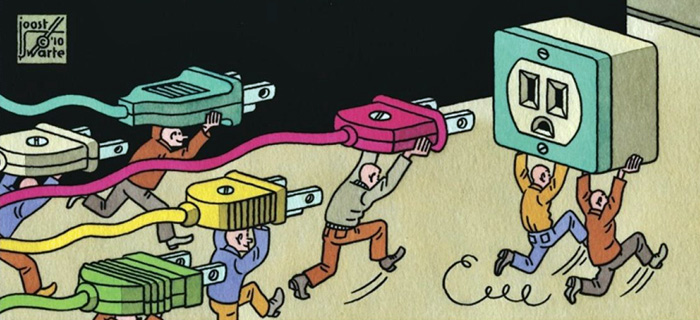Rethinking Lifestyle
Efficiency: Surely this is a Good Thing

Surely the advent of more efficient electric lights ought to be hailed as a great step forward for energy conservation, since lighting consumes a hefty 6.5 percent of the world’s energy supply.
But human behaviour regularly confounds expectations, and in this case we find a seeming paradox. Research has shown that increasing energy efficiency in fact increases the amount of energy consumed in lighting. It’s basic economics, in a way.
We can all agree that light is a good thing. And the law of demand in economics suggests that if the price of a good thing goes down, people will always want more of it. (The concept of “enough” has never really caught on in economics.)
This was the case years ago when gas lighting replaced candles and whale fat – cheaper light led to higher demand, including a demand for street lights! The conversion to more-energy-efficient electric lights led to another increase in the demand for lights. A typical resident of the western world now consumes 100,000 times as much light as he would have, had he lived in western Europe in 1700.
Light is so much in demand that the increase in consumption wipes out the gains from efficiency, so more energy rather than less is used. We are seeing this now, as solid-state lighting replaces compact fluorescent lamps. This was recently reported in Economist news magazine. The LEDs will be better for the environment, if and only if we remain satisfied with today’s level of lighting. But we won’t be, if history is any indication. Efficiency is expected to increase by a factor of 3, while consumption of light is expected to increase by a factor of 10. We’ll need twice as much energy to satisfy our demand for light.
We’ll have brighter indoor lighting, better-lit retail spaces. We’ll switch off fewer lights. And, security-obsessed as we are, we’ll light up outdoor spaces that are currently dark. That would be a good thing in some neighborhoods, but it has side-effects.
If you haven’t seen the Milky Way lately, get your views in now. Light pollution (combined with air pollution) already obscures all but the brightest stars in urban areas.
Similarly more efficient cars don’t lead to less gasoline consumption, in case you were wondering. Cheaper car travel makes private transportation more attractive relative to public transportation. With more efficient cars, people drive more.
It doesn’t mean we shouldn’t pursue those gains, it just means we can’t expect relative prices to make us virtuous people. We still have to confront the culture of “more” in the context of well-lit 24/7 consumerism.
The paradox described is known as the Rebound Effect, or Jevon’s paradox. This effect is by no means limited to lighting and gasoline efficiency. Jevon, in fact, built his theory by observing how the development of more efficient steam engines lead to an increased demand for coal. This Rebound Effect affects the way we use all resources.
This is why government subsidies to promote energy efficiency will do little to improve the environmental health of the planet. What governments need to do is increase the cost of the resource, or limit the availability of the resource. This is never popular, which is why governments are hesitant to do it. A subsidy for the building of an oil pipeline will be more popular than a tax on carbon, even though the pipeline will do environmental damage and the tax will preserve the environment.




